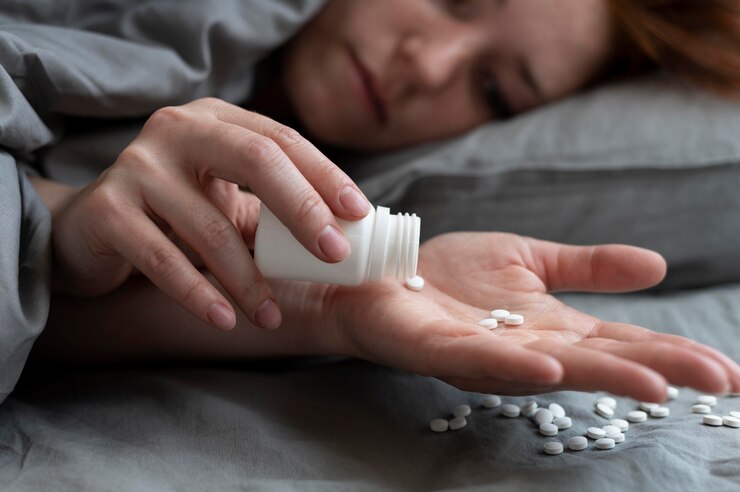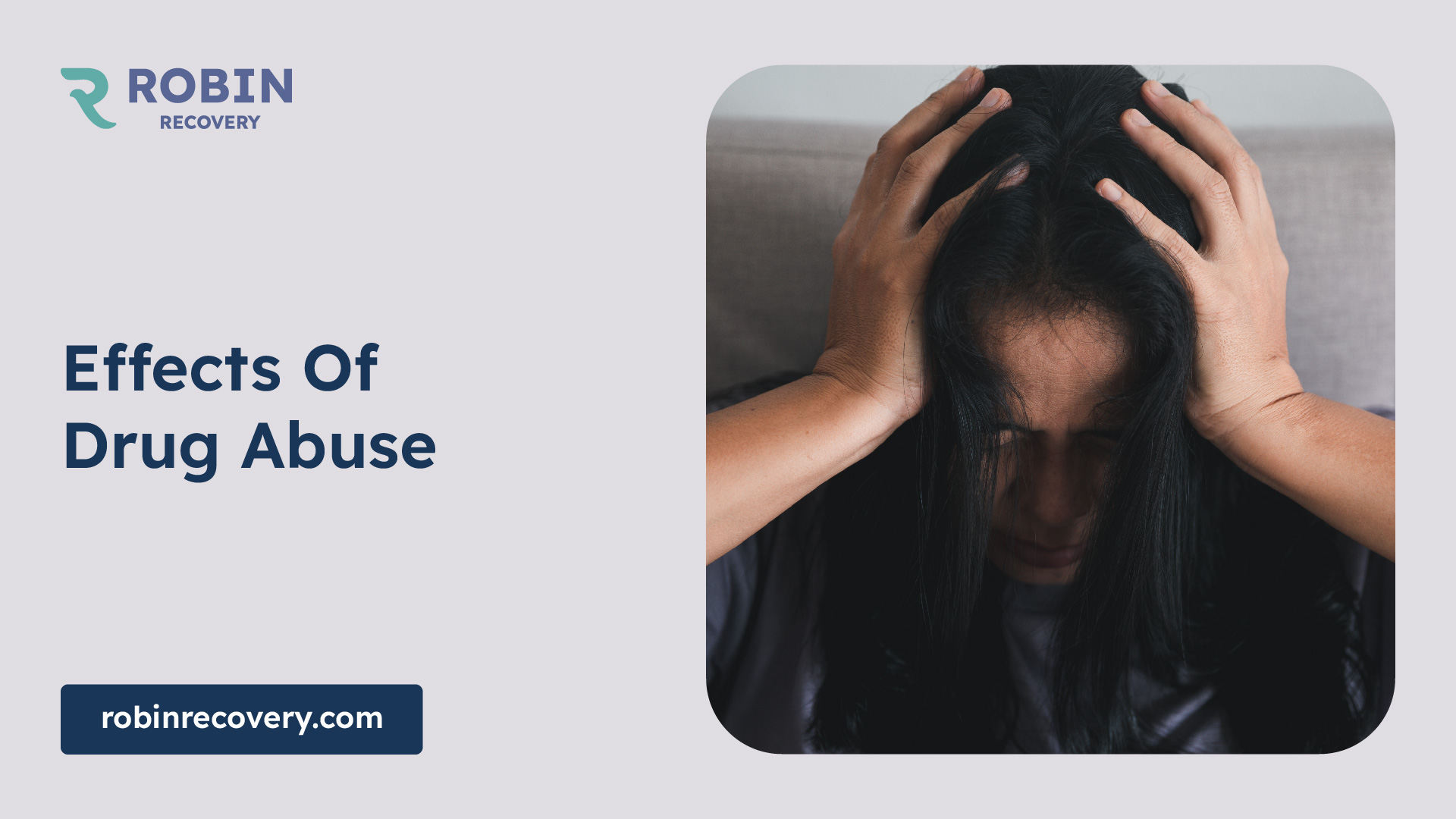Effects Of Drug Abuse

Effects of Drug Abuse
The repercussions of drug abuse are multilayered, affecting both physical and mental health, and extending to societal implications. The immediate and long-term impacts can be significant, highlighting the importance of understanding the potential consequences of substance misuse.
Short-Term Impact
The short-term effects of drug abuse vary depending on the substance used, but some common effects include increased heart rate, blood pressure, and body temperature, as well as an elevated concentration of dopamine in the brain which leads to intense euphoria [1].

For instance, the abuse of substances like methamphetamine, even in small doses, can increase wakefulness, physical activity, decrease appetite, and lead to various cardiovascular issues such as rapid heart rate, irregular heartbeat, and increased blood pressure.
In severe cases, an overdose can cause hyperthermia and convulsions, potentially leading to death if not treated promptly.
Long-Term Consequences
The long-term consequences of drug abuse are even more concerning, as they often involve significant changes to the brain that affect judgment, decision-making, memory, learning, and behavior control.
For example, methamphetamine use releases high levels of dopamine in the reward circuit, contributing to feelings of euphoria and teaching the brain to repeat the pleasurable activity of taking the drug. However, this elevated dopamine release is associated with addictive behavior and can have harmful effects on nerve terminals in the brain.
In clinical terms, drug addiction manifests as compulsive drug seeking, drug use, and cravings that can persist and recur even after extended periods of abstinence. This addiction is a disorder of altered cognition, with drugs altering normal brain structure and function in these regions, producing cognitive shifts that promote continued drug use and hinder the acquisition of adaptive behaviors that support abstinence.
Understanding these effects is crucial in addressing the issue of drug abuse and developing effective prevention and treatment strategies. It underscores the importance of not only addressing the physical aspects of substance use disorders but also the cognitive and societal implications.
Methamphetamine Abuse
Methamphetamine abuse is a prevalent issue that has both immediate and long-term effects. Understanding these effects can help raise awareness about the dangers of this drug and the need for comprehensive treatment strategies.
Immediate Effects
Even small doses of methamphetamine can have considerable immediate effects. It can increase wakefulness, physical activity, and decrease appetite. This drug also impacts cardiovascular health, leading to a rapid heart rate, irregular heartbeat, and increased blood pressure. In severe cases, an overdose can result in hyperthermia and convulsions, which can be fatal if not promptly treated.
Methamphetamine use promotes the release of high levels of dopamine in the brain's reward circuit. This neurotransmitter is responsible for feelings of euphoria and teaches the brain to repeat the pleasurable activity of taking the drug. The excess dopamine release is closely associated with addictive behavior.
Long-Term Risks
The long-term risks of methamphetamine abuse are significant and far-reaching. Chronic use of this drug can lead to changes in the brain that affect judgment, decision-making, memory, learning, and behavior control.
The high dopamine release associated with methamphetamine use can also have deleterious effects on nerve terminals in the brain. This damage can manifest as cognitive deficits, impairing the ability to learn new patterns of thought and behavior. Such cognitive impairments can hinder successful treatment and recovery.
The developing brain is particularly susceptible to the effects of drugs of abuse, including methamphetamine. Prenatal, childhood, and adolescent exposures to these substances can produce long-lasting changes in cognition and behavior. These effects may persist beyond childhood and increase the risk of future substance abuse.
In summary, methamphetamine abuse poses severe immediate and long-term risks. Recognizing these risks is crucial for individuals, families, and communities to seek timely interventions and implement effective prevention strategies.
Psychological Treatments
Psychological treatments play a significant role in substance abuse recovery, helping individuals understand and combat the effects of drug abuse. These treatments involve various interventions and therapies, each specifically designed to address the unique psychological aspects associated with substance abuse.
Effective Interventions
Research has shown that psychosocial interventions, such as cognitive behavior therapy, motivational interviewing, and relapse prevention, have been found to be effective across many drugs of abuse [4].
One such intervention is Brief Opportunistic Interventions (BIs), which can serve as an effective first level of treatment for those struggling with substance use disorders. BIs have been found to result in a 20-30% reduction in excessive drinking and have a substantial evidence base showing their effectiveness in various settings such as primary care and accident and emergency departments.
Another key intervention is Motivational Interviewing (MI), a counseling approach that has been widely studied in alcohol abusing and dependent populations. It effectively improves treatment adherence and drinking outcomes [4].
Combination Therapies
In the realm of substance abuse treatment, the combination of therapies often results in more effective outcomes. For instance, psychological treatment proves to be more effective when combined with substitute prescribing than when medication or psychological treatment is used alone, particularly for opiate users.
Moreover, Motivational Interviewing (MI) is also viewed as being most effective when combined with other standard psychosocial interventions. This combination approach allows for a more comprehensive treatment plan that addresses multiple aspects of substance abuse, thereby enhancing the overall effectiveness of the treatment [4].
By adopting effective interventions and combination therapies, individuals struggling with substance abuse can significantly improve their chances of recovery. The key lies in tailoring the treatment plan to the unique needs of the individual, taking into account their substance of choice, the severity of their addiction, and any co-occurring mental health disorders. With the right support and treatment, recovery is within reach.
Societal Impact
The effects of drug abuse extend far beyond the individual user, impacting society as a whole. This ripple effect is seen in various areas, including an increase in drug-related deaths and workplace safety concerns.
Drug-Related Deaths
In 2003, over 25,000 people died from drug-induced effects in the United States, according to the National Drug Intelligence Center. This startling figure underscores the deadly effects of drug abuse not only on the users but also on the families and communities left behind.
These deaths are a tragic loss of life and potential, with many of the victims being young and otherwise healthy individuals. The impact on the family members of these victims is also significant, leading to emotional pain and financial instability.
Workplace Safety Concerns
Workplace safety is another area that is severely affected by drug abuse. In 2004, Quest Diagnostics reported that 5.7 percent of drug tests conducted on individuals involved in employment-related accidents were positive for drugs [5].
This statistic highlights how drug abuse by employees can compromise workplace safety, leading to accidents and injuries. Furthermore, drug abuse in the workplace can also affect productivity and employee morale.
In addition to these direct impacts, drug abuse also has indirect effects on society. For example, the production of illicit drugs such as methamphetamine can lead to environmental damage and public health risks. In 2004, methamphetamine producers in the U.S. led to the seizure of 9,895 illicit methamphetamine laboratories, affecting 2,474 children. Twelve children were injured, and three children were killed due to exposure to chemicals or displacement from their homes [5].
Understanding the societal impact of drug abuse is crucial for developing effective prevention and intervention strategies. By addressing the root causes of drug abuse, we can help to reduce its devastating effects on individuals and society.
Cognitive Effects
Drug abuse brings about significant changes in the brain's structure and function, leading to cognitive shifts that encompass both brain alterations and cognitive deficits.
Brain Alterations
Drug addiction manifests clinically as compulsive drug seeking, drug use, and cravings that can persist and recur even after extended periods of abstinence. This is primarily due to the alteration in brain regions and processes that support cognitive functions such as learning, memory, attention, reasoning, and impulse control. The regions of the brain that underlie addiction overlap extensively with those supporting these cognitive functions, causing drugs to alter normal brain structure and function in these regions. This leads to cognitive shifts that promote continued drug use and hinder the acquisition of adaptive behaviors that support abstinence.
In the early stages of drug abuse, drug activity in the brain creates strong maladaptive associations between drug use and environmental stimuli. These associations may underlie future cravings and drug-seeking behaviors, setting the stage for a cycle of addiction that can be difficult to break.
Cognitive Deficits
While certain drugs of abuse such as cocaine, nicotine, and amphetamine can acutely enhance learning and attention, chronic drug abuse can lead to cognitive deficits. This impairs the ability to learn new patterns of thought and behavior that support successful response to treatment and recovery, further complicating the process of breaking free from addiction [3].
Furthermore, prenatal exposure to drugs of abuse, such as alcohol, cocaine, opioids, and tobacco, can have significant deleterious effects on cognition and behavior. This includes impairments in language skills, impulse control, attention, visual attention, and memory. These effects can persist beyond childhood, increasing the risk of future substance abuse.
In summary, the cognitive effects of drug abuse extend beyond the individual, potentially impacting future generations and contributing to a cycle of substance abuse. Understanding these effects is crucial in developing effective prevention and treatment strategies.
Prevention Strategies
Addressing the effects of drug abuse requires a multi-faceted approach, focusing not only on treatment but also prevention. This section will explore two key prevention strategies: adolescent programs and family interventions.
Adolescent Programs
Prevention programs for adolescents target risk and protective factors at the individual, family, and community levels. These programs are guided by psychosocial theories regarding the etiology of substance use and abuse [6].
Adolescence is a critical developmental stage, and substance use is often linked to important developmental goals and transitions during this period. For some adolescents, substance use can be seen as a way of achieving independence, maturity, or popularity. However, social influences, such as positive attitudes and expectations regarding substance use, can also promote the initiation and experimentation of substance use.
Effective prevention programs can be implemented in various settings, including schools, families, and communities. School-based programs focus on building drug resistance skills, self-regulation, social skills, and changing normative expectations. Family-based programs aim to improve parenting skills, family functioning, communication, and bonding. Community-based programs use multiple intervention strategies to address community-wide patterns of alcohol use and enforce laws regarding alcohol use and sales.
Family Interventions
Family interventions can be a powerful tool in preventing and addressing substance use disorders (SUDs). These interventions can influence or pressure the family member with the SUD to enter treatment, support the family member with the SUD, address the impact of the SUD on the family system and members, and help the family cope with their own reactions and problems.
Literature supports couples and family approaches to SUDs as these can reduce the emotional burden for family members and aid them in coping effectively with the affected family member. By addressing the impact of substance use on the family as a whole, these interventions can help to create a supportive environment that promotes recovery and reduces the risk of relapse.
In conclusion, prevention strategies that focus on adolescents and families are crucial in addressing the far-reaching effects of drug abuse. By implementing evidence-based prevention programs and interventions, it is possible to reduce substance use behaviors, support individuals with SUDs, and mitigate the impact of drug abuse on families and communities.
References
[1]: https://sunshinebehavioralhealth.com/blog/short-and-long-term-effects-of-drugs/
[2]: https://nida.nih.gov/publications/research-reports/methamphetamine/what-are-immediate-short-term-effects-methamphetamine-misuse
[3]: https://www.ncbi.nlm.nih.gov/pmc/articles/PMC3120118/
[4]: https://www.ncbi.nlm.nih.gov/pmc/articles/PMC4031575/
[5]: https://www.justice.gov/archive/ndic/pubs11/18862/impact.htm
[6]: https://www.ncbi.nlm.nih.gov/pmc/articles/PMC2916744/
[7]: https://www.ncbi.nlm.nih.gov/pmc/articles/PMC4158844/
